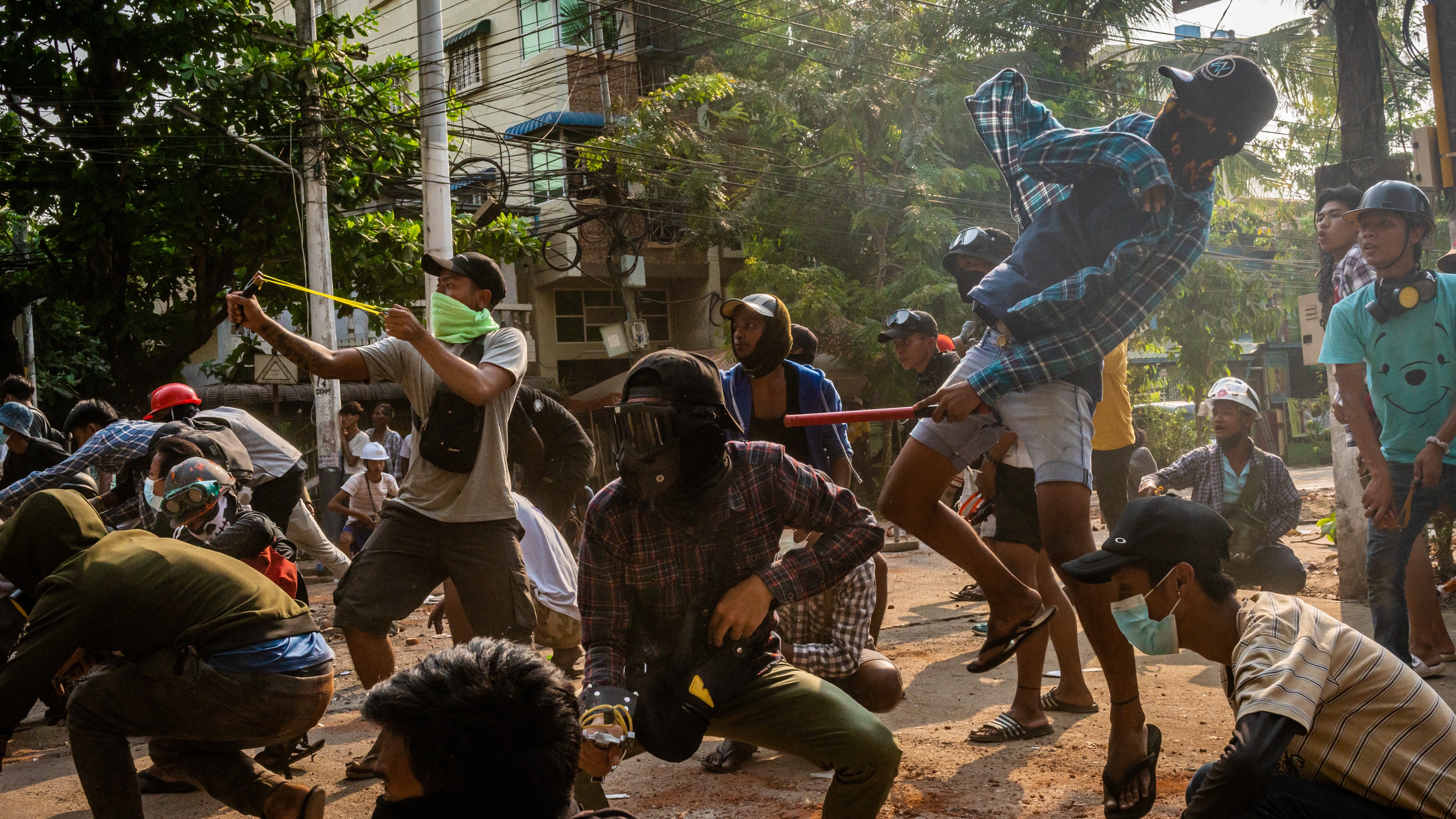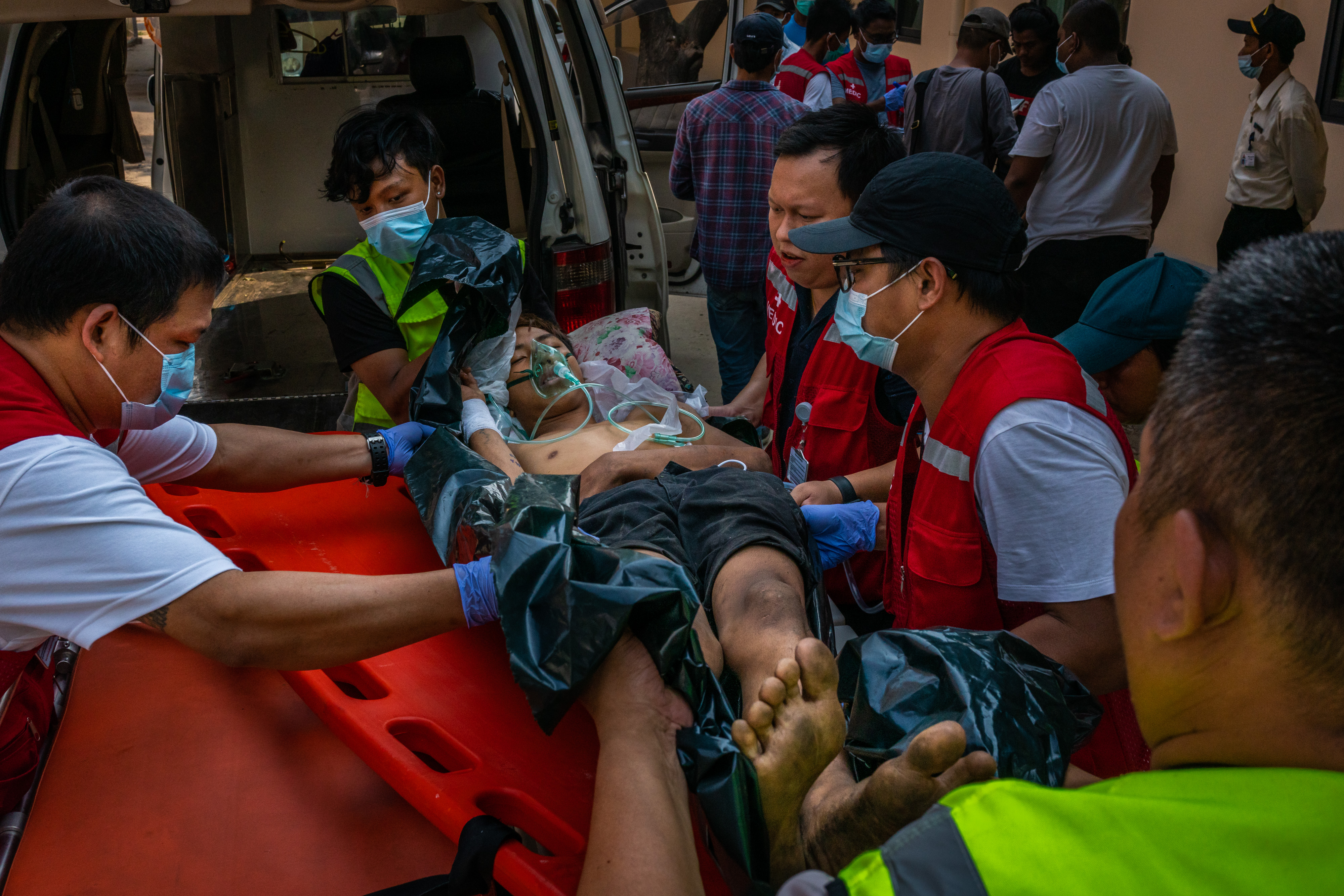How the world reported Myanmar’s ‘day of shame’ after more than 100 protestors killed
Children among the dead in ‘bloodiest’ crackdown since military coup

A free daily email with the biggest news stories of the day – and the best features from TheWeek.com
You are now subscribed
Your newsletter sign-up was successful
“They see protesters as criminals because if someone disobeys or protests the military, they are criminal. Most soldiers have never tasted democracy for their whole lives. They are still living in the dark.”
Leaders across the world have condemned the violence that has erupted in Myanmar following a military coup at the start of February, but this damning description of the troops behind the bloodshed comes from within.
Until earlier this month, Captain Tun Myat Aung led the 77th Light Infantry Division, a division in the military - known as Tatmadaw - that is “notorious for its massacres of civilians”, The New York Times (NYT) reports.
The Week
Escape your echo chamber. Get the facts behind the news, plus analysis from multiple perspectives.

Sign up for The Week's Free Newsletters
From our morning news briefing to a weekly Good News Newsletter, get the best of The Week delivered directly to your inbox.
From our morning news briefing to a weekly Good News Newsletter, get the best of The Week delivered directly to your inbox.
But then he “logged on to Facebook to discover that several civilians had been killed” in Yangon, Myanmar’s former capital, as the crackdown on anti-coup protests escalated, the paper continues. The killers were “men in uniform, just like him” - so that night he “slipped off base and deserted”.
“I love the military so much,” Tun Myay Aung told the paper. “But the message I want to give my fellow soldiers is, if you are choosing between the country and the Tatmadaw, please choose the country.”
That plea is being echoed across the globe after Myanmar’s junta “left more than 100 people - including several children - dead, in the bloodiest day since the coup two months ago”, The Guardian reports.
According to the UN, a total of at least 107 people were killed on Saturday as troops ramped up the protests crackdown while military leaders celebrated Armed Forces Day – an annual event marking the start of the resistance to Japanese occupation in 1945.
A free daily email with the biggest news stories of the day – and the best features from TheWeek.com
The violence on Myanmar’s streets this weekend “represented a new low in the country’s recent lurch back to despotism”, says The Telegraph. The Tatmadaw even “intervened in funerals to arrest those who had taken part in the demonstrations”, the newspaper adds.
In Yangon, “plumes of smoke” rose above the city, where “residents heard non-stop shooting through the night”, Frontier Myanmar reports.
At least five protestors were killed when “police opened fire” on a group “gathered in front of a police station in the city’s south to call for the release of their friends'”, the Yangon-based magazine continues. Meanwhile, a “baby playing on the street in a northern Yangon township was hit in the eye with a rubber bullet” when security forces opened fire.

The killing represents the “worst orgy of violence to date” in the conflict in Myanmar, which appears to be “entering a new phase”, says Der Spiegel, in an article headlined “the end of humanity”.
In the early weeks of the coup, the military “still allowed a comparatively large amount of protest”, the German magazine reports. But over the weekend, “shooters executed individual protesters practically every day, often with targeted head shots”.
The violence is not confined to Yangon, with reports of police killing a man in the northern city of Mandalay on Saturday “by throwing him on to a stack of burning tyres”, The Times reports. And in the nearby city of Meiktila, “a 13-year-old girl was shot dead when security forces opened fire to disperse protesters”.
The generals overseeing the growing tide of violence are “turning their country once more into a pariah state”, The Telegraph warns.
Joe Biden is leading global condemnation of what the US president has described as the “absolutely outrageous” crackdown.
EU Minister for Foreign Affairs Josep Borrell said the junta’s celebration of the armed forces had been blighted by “a day of horror and of shame”, while UK Foreign Secretary Dominic Raab tweeted that the “killing of unarmed civilians, including children, marks a new low”.
The defence chiefs of the US, UK, Japan and nine other countries have also spoken out. In what The Guardian describes as a “rare joint statement”, the group said: “A professional military follows international standards for conduct and is responsible for protecting - not harming - the people it serves.”
Saturday’s bloodshed pushed the total tally of people confirmed to have been killed by the Myanmar military since the coup to 459, according to the local monitoring group Assistance Association for Political Prisoners (AAPP).
The “randomness” of the latest killings was “particularly shocking”, writes BBC Burmese reporter Moe Myint.
“Armed with battlefield weapons, the security forces appeared willing to shoot anyone they saw on the streets,” Myint reports. “The brutality they showed they were capable of is on another level from what we have seen since the coup.”
And “neither side - the military nor the pro-democracy movement - is willing to back down”.
For former Tatmadaw captain Tun Myat Aung, the sight of the military loading live rounds into their weapons was the moment that he “lost hope for Myanmar”.
“Most of the soldiers have been disconnected from the world, and for them the Tatmadaw is the only world,” he told the NYT. “I realised that most of the soldiers see the people as the enemy.”
Joe Evans is the world news editor at TheWeek.co.uk. He joined the team in 2019 and held roles including deputy news editor and acting news editor before moving into his current position in early 2021. He is a regular panellist on The Week Unwrapped podcast, discussing politics and foreign affairs.
Before joining The Week, he worked as a freelance journalist covering the UK and Ireland for German newspapers and magazines. A series of features on Brexit and the Irish border got him nominated for the Hostwriter Prize in 2019. Prior to settling down in London, he lived and worked in Cambodia, where he ran communications for a non-governmental organisation and worked as a journalist covering Southeast Asia. He has a master’s degree in journalism from City, University of London, and before that studied English Literature at the University of Manchester.
-
 The environmental cost of GLP-1s
The environmental cost of GLP-1sThe explainer Producing the drugs is a dirty process
-
 Nuuk becomes ground zero for Greenland’s diplomatic straits
Nuuk becomes ground zero for Greenland’s diplomatic straitsIN THE SPOTLIGHT A flurry of new consular activity in Nuuk shows how important Greenland has become to Europeans’ anxiety about American imperialism
-
 ‘This is something that happens all too often’
‘This is something that happens all too often’Instant Opinion Opinion, comment and editorials of the day
-
 How corrupt is the UK?
How corrupt is the UK?The Explainer Decline in standards ‘risks becoming a defining feature of our political culture’ as Britain falls to lowest ever score on global index
-
 The high street: Britain’s next political battleground?
The high street: Britain’s next political battleground?In the Spotlight Mass closure of shops and influx of organised crime are fuelling voter anger, and offer an opening for Reform UK
-
 Is a Reform-Tory pact becoming more likely?
Is a Reform-Tory pact becoming more likely?Today’s Big Question Nigel Farage’s party is ahead in the polls but still falls well short of a Commons majority, while Conservatives are still losing MPs to Reform
-
 Taking the low road: why the SNP is still standing strong
Taking the low road: why the SNP is still standing strongTalking Point Party is on track for a fifth consecutive victory in May’s Holyrood election, despite controversies and plummeting support
-
 What difference will the 'historic' UK-Germany treaty make?
What difference will the 'historic' UK-Germany treaty make?Today's Big Question Europe's two biggest economies sign first treaty since WWII, underscoring 'triangle alliance' with France amid growing Russian threat and US distance
-
 Is the G7 still relevant?
Is the G7 still relevant?Talking Point Donald Trump's early departure cast a shadow over this week's meeting of the world's major democracies
-
 Angela Rayner: Labour's next leader?
Angela Rayner: Labour's next leader?Today's Big Question A leaked memo has sparked speculation that the deputy PM is positioning herself as the left-of-centre alternative to Keir Starmer
-
 Is Starmer's plan to send migrants overseas Rwanda 2.0?
Is Starmer's plan to send migrants overseas Rwanda 2.0?Today's Big Question Failed asylum seekers could be removed to Balkan nations under new government plans